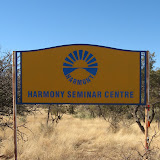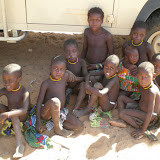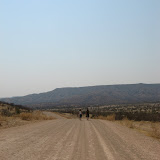The eclectic ramblings of a PCV in Namibia...Of course these are my thoughts, and do not reflect opinions of the Peace Corps or US Government in any way, shape, or form.
Saturday, December 19, 2009
Best and Worst round 2 + Happy holidays!
Thursday, December 17, 2009
Best and Worst
The Road Not Taken
And be one traveler, long I stood
And looked down one as far as I could
To where it bent in the undergrowth;
Then took the other, as just as fair,
And having perhaps the better claim,
Because it was grassy and wanted wear;
Though as for that the passing there
Had worn them really about the same,
And both that morning equally lay
In leaves no step had trodden black.
Oh, I kept the first for another day!
Yet knowing how way leads on to way,
I doubted if I should ever come back.
I shall be telling this with a sigh
Somewhere ages and ages hence:
Two roads diverged in a wood, and I--
I took the one less traveled by,
And that has made all the difference.
Wednesday, December 16, 2009
750
Tuesday, December 15, 2009
Metaha.....
Friday, December 11, 2009
Rest in Peace...
Wednesday, December 9, 2009
Digging in the dirt




Parabuthus capensis

A picture is worth a thousand words...
Wednesday, November 25, 2009
Measles and...Elections?
Gobble, gobble, gobble

Monday, November 23, 2009
Okuti onguza
Words to live by...
Wednesday, November 11, 2009
Adventures...
Monday, November 9, 2009
Measles Update:
Friday, November 6, 2009
Omeva...
Thursday, November 5, 2009
Otjinguenjenje
Otjinguenjenje is the Otjiherero word for Measles. The entire Northern area of Kunene Region is being heavily affected by Measles at the moment. The outbreak started about a month ago, and so far Opuwo District has had 292 cases reported. Currently we have 36 patients on admission (15 adults, 21 children) and to date we have admitted 120 patients at Opuwo Hospital. Thus far two people have died: one a woman of 42, the other a two year-old child.
Measles is a virus which is highly contagious, and also highly preventable. Symptoms include rash, coughing, fever, conjunctivitis, and spots in the mouth (Koplik spots). In the Western world, people are routinely immunized for Measles as children, and outbreaks are virtually unheard of. However the vast majority of people in my area are not protected, and as a result Measles is spreading like wildfire. In schools children often stay in "hostels," where they sleep in close quarters, and the home situation is very much the same; the traditional style of living here keeps families very close together. As such, when one person is exposed, they then spread the virus to many other people.
This crisis has stretched us to the limit. Our wards are overflowing with people, and after three patients who were here for treatment for other diseases contracted measles, along with two hospital staff members, we reached out for assistance from other organizations in Namibia. Thanks to the Namibian Defense Force, we have now had five tents donated to our health facility so that Measles patients can be kept in relative isolation. Some nurses have also joined us from other regions of Namibia, and they are helping to ease the heavy burden on our staff.
So its been a very busy time here, to say the least. As one of the coordinators for the social mobilization/targeted immunization campaign, I have been working to help ensure that we protect as many children as possible from this disease. Last week we had 8 teams in the field, and over the course of 3 days they were collectively able to immunize 581 children who had not been previously immunized. It was a great start, and hopefully this week will prove to be an even greater success. Despite the fact that we are facing a transport crisis, as well as a water crisis, progress is being made!
There is still a lot of work to be done...wish us luck!

Wednesday, September 30, 2009
Here comes the rain!

Friday, September 4, 2009
Hungira....
Friday, August 21, 2009
Ongombe.....

Tuesday, August 18, 2009
Namlish...
- "I am coming now" = "I am leaving and will be back at some undisclosed time" (this is often used as someone is walking out of the room)
- "Now now" (as in 'i am coming to meet you now now') = "it will happen eventually" note: the number of "nows" generally indicates the urgency so if someone says they will do something "now now" it may happen in the next few days, whereas if they said "now now now now now" it may happen within the next few hours
- "Iz it?" = wow, i had to think for about 5 mins before i could remember the English equivalent "really? for real? is that so?"
- "So?" = used in my region the same way that 'Iz it' is used in the rest of the country
- "Borrow me" (as in "Borrow me a dollar") = " give me" the concept of "borrowing" something doesn't really exist in most Namibian cultures; lending and giving are typically considered the same thing.
- "nay?" (as in "the weather is hot today, nay?") = often used as a way to affirm your statement
- "a rubber" = "rubber band" Im sure you can imagine how confused and surprised I was the first time one of my older female colleagues asked me to "borrow her a rubber."
- "naughty" = "bad" this is generally used to describe people or animals and it still makes me giggle every time i hear it. "oh, that cow is very naughty"
- "Fine/nawa" = Fine (nawa) can be used as a response to a greeting, such as "how are you? I am fine" or as the entire greeting. Occasionally I will pass someone in the street and they will greet me with "Fine" or "Nawa." This might be unique to my area, where making an "Mmmmmmmmm" sound at the back of your throat is also considered a greeting.
Monday, August 17, 2009
 |
| Harmony Center/Reconnect |
Tuesday, August 11, 2009
She ventures out......
As of today (July 21, 2009), I have been in
Last week I broke my routine and left site for the first time since I was sworn in as a Peace Corps volunteer back in April. I had my first meeting as a new member the Volunteer Support Network, an organization run by PC Volunteers in
I tried to fall asleep quickly, which wasn’t too difficult because it was 6am (did I forget to mention that?) and when the throbbing in my back forced me to open my eyes a couple of hours later, I was greeted with a lovely surprise. We had just crossed the red line, a check-point which divides the rural north from the rest of the country, when I saw something move in the bush. I squinted my eyes against the harsh morning light and there stood a HUGE elephant, eating his leafy breakfast right off the side of the road! I was so excited to have spotted an elephant in the wild that I literally tried to jump out of my chair. This didn’t go so well, as I bashed my already numb legs into the sharp edge of the keyboard, while simultaneously jarring the poor lady who was sleeping next to me with her head resting against my shoulder. Oops! She sort of snorted awake, and glanced at me for a second before she readjusted the keyboard and fell back to sleep.
My heart pounded as I contemplated the thrill of this sighting. The elephant was remarkable; large and proud, it feasted on the tree totally oblivious to our bus full of people gawking foolishly at it as we barreled down the road. It took my breath away, seeing this giant animal in the wild. No zoo could ever compare. I sealed the mental image of it in my memory, and settled back into my seat only to sit straight back up three minutes later. Moving slowly across the land stalked a herd of 10 full grown giraffes! It was one of those moments where it dawned on me: this is indeed
Spending about five minutes in
Our VSN meeting went very well and it was great to get to spend time with some of my fellow PCV’s. I am now back home in Opuwo for the rest of this week, and then Sunday I will head down to Windhoek again for our “Reconnect” which is a two week long Peace Corps training. I will meet up with my group of Health volunteers for the first time since we swore in so that we can all discuss what we have been doing for the last three months and hopefully gain some skills which we can use in our future projects. I am so excited to see my group again but I must admit the prospect of going back down to
Sunday, June 28, 2009
Wildlife

 This picture is for my mom. She has the most irrational fear of moths, and I enjoy teasing her about it. Betcha cant wait to come visit!
This picture is for my mom. She has the most irrational fear of moths, and I enjoy teasing her about it. Betcha cant wait to come visit! 
 Praying Mantis. There are tons of them around my house and I love them because they eat lots and lots of bugs.
Praying Mantis. There are tons of them around my house and I love them because they eat lots and lots of bugs.
On the outside, it looks like a normal toilet........

But inside it's the home of Ronald and Reagan (thanks for the names sissy)!


She's also likes to help with laundry. :)

Rara <3
Saturday, June 27, 2009
Feels like the first time.....
Thanks to some pressure from my little sister, I am now blogging! Thus far my updates have been sent through email, but its proved to be a pain for a variety of reasons so hopefully this works out better.
In honor of Keri's new blog, i have decided to share some photos from my last four months in Namibia! Hope you enjoy :)


This is the welcoming mural at the Kukiri Center, where we had our Pre-Service Training.

Ashley and I had our Otjiherero language lessons under the grass hut every day :)

A beautiful cactus garden which was right next to our language hut...

The not-so-nice creature which came out of the garden...ya, that's a black mamba.


Group shot with my family: (Top left moving counter-clockwise) My sister Drusilla, and her children Tandiue (age 9), Camerster (age 11), Tjizaa (age 6), and Victoria (age 6)
 Victoria :)
Victoria :)
Victoria and Tandiue playing in the backyard. The white thing in Tandiue's hand is a bunch of rolled-up plastic bags. That is what kids commonly use to play soccer here.
This picture was taken right before I left homestay for my permanent site. It cracks me up every time I look at it because Tandiue is making a marvelous face and Victoria is looking at the T.V. screen. The show that's playing is Camilla, a Spanish soap opera that is dubbed (horribly) in English. The drama is intense and for whatever reason many Namibians are really into it. By the end of training a fair proportion of Group 29 was hooked too!
My kids. <3>
I will just preface the next few pictures by saying Namibian food is great....if you like LOTS of meat! However, if you are vegetarian/PETA friendly (that means you Keri) you may want to skip these next pictures.
Peggy and I preparing the chicken for our meal.


Some of the girls from Nam 29: (from left) Myself, Peggy, Lindsay, Ashley, Shawn, and Amelia.
This picture was taken on our cross-cultural day. We spent the morning learning to prepare regional specialties from many of the different cultural groups in Namibia.
On our Host-Family Appreciation Day we bought a goat and slaughtered it.
My language trainer Richard. He loves warm Coca-Cola, Shamu #2, and throwing babies around. Ok that baby thing is a lie but the rest it true. (:
Richard working the braai. Its necessary to char the hair off of the hooves and head before they can be cooked.


Our trainers Linda and Raymond enjoying the chow. Linda is going to kill me if she sees this picture because she has a whole plate full of meat. Love you Linda!
My host-mom Barbara and I during our host family award ceremony.

This is a typical training day. We often lounged around on the grass during our much-needed break time.

Swearing in ceremony. We are now PCV's as of April 17, 2009! Whooooo!









